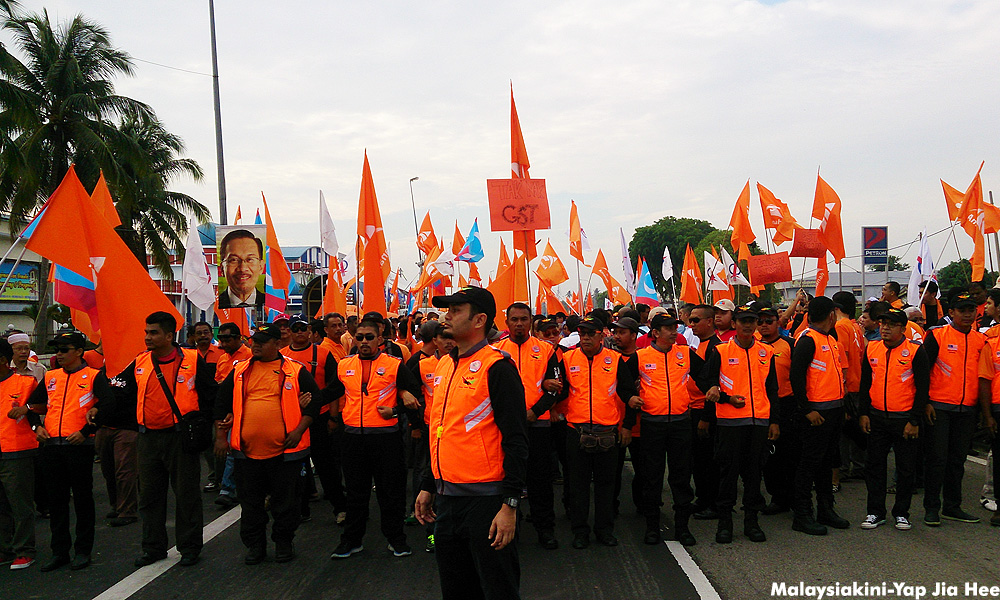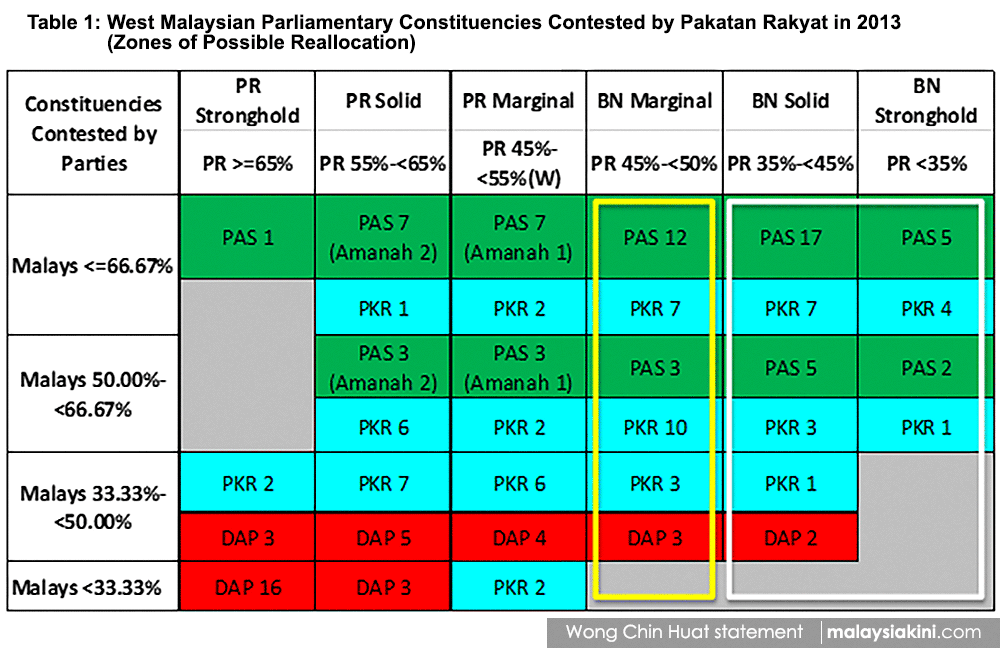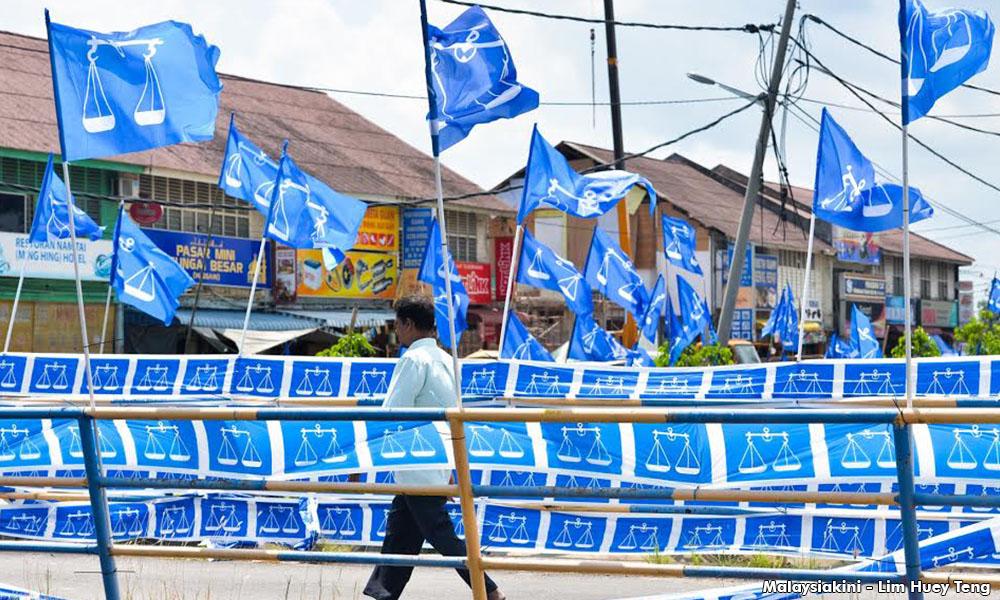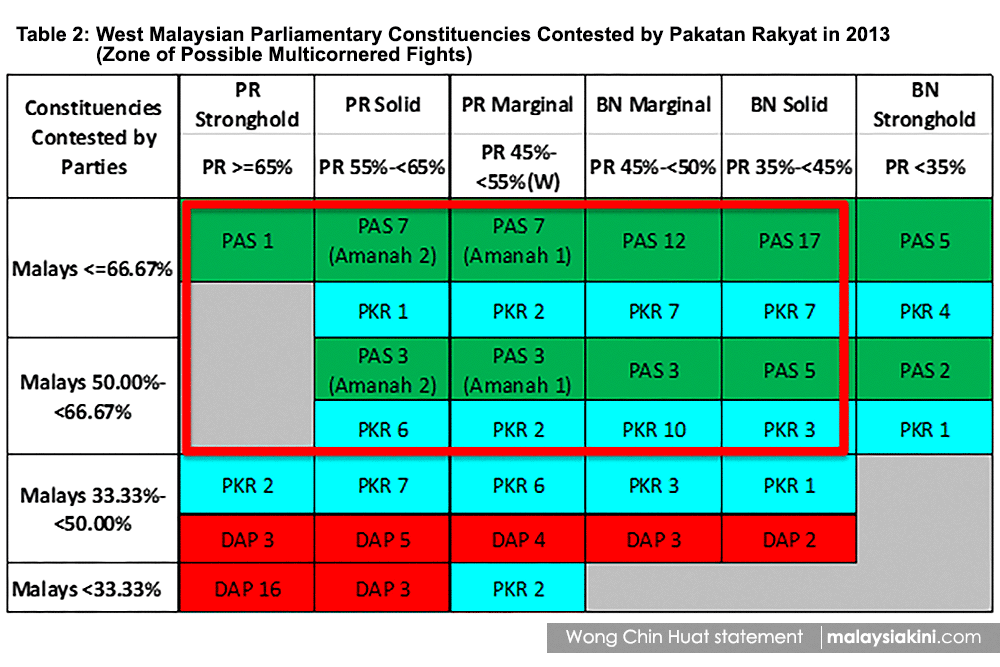COMMENT | Many members of the public as well as opinion leaders are deeply frustrated by the boiling dispute between the opposition parties over seat negotiations and fear that multi-cornered fights may give Prime Minister Najib Razak an easy victory at the upcoming GE14.
I support calls to minimise multi-cornered fights but also believe the public should have a realistic expectation on what may prevail so that this will not eventually keep voters at home on election day.
(Disclaimer: I am not involved in seat negotiations. The analysis below is purely based on my understanding of Malaysian politics and not representing any party’s position. I stand corrected where my desk analysis is inaccurate.)
Seats are normally divided between Malaysian parties on two grounds: contestation record and ethnic composition. In a nutshell, parties get to keep the seats they won, and only lost constituencies are reallocated between the aspiring parties.
By this convention, an opposition’s electoral pact in GE14 would mean DAP, PKR and PAS would get to keep the 31, 28 and 21 parliamentary seats in West Malaysia they won in GE13, while the remaining 85 constituencies they lost (the yellow and white boxes in Table 1) would be redistributed among them and the two new parties, Amanah and Bersatu.

This is however complicated by two issues.
First, PAS has lost six of its 21 parliamentarians to Amanah and one (Tumpat) to PKR and may lose one more (Pokok Sena) to Bersatu. Should these constituencies stay with the incumbent parliamentarians or PAS?
Second, because PAS contested the most constituencies in 2013 (65) and won the least (21), 44 seats – or slightly over half of the constituencies lost by Pakatan Rakyat (85) - to be redistributed would come from PAS.
This makes a conventional solution seemingly a bad deal for PAS. While individual PAS lawmakers want straight fights to avoid disastrous defeats such as the one in the Sungai Besar by-election and capture gain from Malays’ discontent against Najib, its top leadership is less keen.
PAS’ long-term viability at stake
Before Amanah, PAS has had two splinter parties - Berjasa led by former Kelantan menteri besar Mohamad Nasir and Hamim led by former party president Asri Muda. Both splinters lost steam after one election.
PAS would hope for the same for Amanah, but Amanah is distinct from these two in one way: Berjasa and Hamim were pro-Umno, which is the position PAS is taking today.
Allowing Amanah to survive may present an existential threat to PAS, not least to its president Abdul Hadi Awang and his hardliner lieutenants. From this particular consideration, going down together with Amanah is better than any win-win settlement. After all, PAS believes it can afford a wipe-out and rise from the ashes like a phoenix.

But even a straight-fight arrangement with Bersatu may not be appealing for PAS, even though its state leaders in Kedah and Johor are keen.
Out of the 38 BN marginal seats which BN won with no more than 55% of votes (yellow box in Table 1), 15 were contested by PAS and 12 of these constituencies were Malay-dominant. Obviously, a deal means some of these would have to be conceded to Bersatu.
As many PAS leaders resent having to play second fiddle to Anwar Ibrahim and PKR in the past, strengthening another Umno’s splinter – whose top leader was blamed for the Memali incident – at its own expense certainly would not serve PAS’ best interests.
In other words, the competition posed by Amanah and Bersatu to PAS makes a win-win deal difficult, even without any courting from Umno, unless one is happy to sacrifice the two newbies to please PAS.
Indeed, any breakthrough will require strong internal pressures from those pro-pact PAS leaders driven by their own existential anxiety.

How extensive will multi-cornered fights be?
Whatever one may say of PAS, it seems to be the party that best understands the ‘first past the post’ (FPTP) system. It knows well it is too crowded to have five Malay-based parties in Peninsular Malaysia under FPTP and it is trying its best to thrive, at least, as the third party.
Despite winning only around 15% of votes at its height and an exodus of talents since 2015, PAS is hitting way above its weight. By threatening to split votes, it successfully positions itself as the kingmaker in GE14.
It is in PAS’ interest to play hardball if it believes that PKR may make more concessions – and spare PAS from giving up winnable constituencies - to accommodate Bersatu and Amanah in its desperation to avoid multi-cornered fights.
I believe Pakatan Harapan should continue to engage PAS. Its leaders and grassroots should avoid unnecessary attacks on PAS’ base. Stupid provocations will only help PAS to call out its voters and make it stronger.
However, counter-intuitively, the best way to secure a better and faster deal may be just to fully prepare for multi-cornered fights to take winds out of PAS’ sails. Those who want to limit multi-cornered fights must first overcome their anxiety and assess how extensive multi-cornered fights may be in the worst scenario.
We can first rule out where multi-cornered fights may not matter.
Firstly, they may not matter where the non-Malays make up at least half of the electorate. This means 48 constituencies currently held by DAP and PKR, and nine others lost by them, would largely be unaffected. Some of these constituencies may need to worry about voters’ turnout but an aggressive PAS’ onslaught may just help to bring out the votes.

Secondly, they may not matter in 12 BN strongholds where PAS or PKR previously won less than 35% of votes. Bersatu may make some breakthroughs in constituencies like Langkawi, Putrajaya and Pagoh.
At stake would possibly be the remaining 96 constituencies (red box in Table 2), which include 14 currently held by PAS, 11 by PKR, six by Amanah and Bandar Tun Razak (held by former Selangor menteri besar Khalid Ibrahim). BN would also stand better chances to keep its 32 marginals.
No, it would not please voters if Harapan and PAS fight each other in over 90 constituencies. But multi-cornered contests cease to be a problem if one party is seen as a spoiler.
Negotiate from position of strength
PAS would remember well what happened when it contested 95 out of 132 parliamentary constituencies in Peninsular Malaysia in 1986 – one candidate won, 20 lost their deposits.

The only way for Harapan to deter PAS from playing spoiler is to negotiate from a position of strength.
This requires not only an early preparation for possible multi-cornered fights on the ground, but a cohesive and concrete vision of how it will run the country to excite voters and avoid communal incoordination.
It must ditch the perception that Harapan under Mahathir’s leadership means just an ad hoc, cynical, unholy alliance against Najib.
It needs a clear roadmap for transition to confirm PAS as a spoiler if PAS so chooses.
Part 1: What is more fatal than multi-cornered fights?
Part 2: PAS the kingmaker in GE14?
Part 3: What Malaysia needs is a transition pact
WONG CHIN HUAT is a research fellow with Penang Institute, the state government think-tank on public policy.
The views expressed here are those of the author/contributor and do not necessarily represent the views of Malaysiakini.

